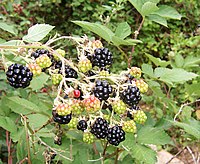
Photo from wikipedia
A plant’s stress response involves the production of phytochemicals, including phenolic compounds. Their synthesis can be modulated by organic (ORG) or non-organic (NORG) farming systems in which they are grown.… Click to show full abstract
A plant’s stress response involves the production of phytochemicals, including phenolic compounds. Their synthesis can be modulated by organic (ORG) or non-organic (NORG) farming systems in which they are grown. To examine this issue, thirteen plant-based foods cultivated in ORG and NORG systems were compared in terms of antioxidant capacity, total content of phenolics, anthocyanins, flavan-3-ols and flavonols. The results showed that NORG fruits tended to have higher phenolic compounds content, whereas ORG fruits had more antioxidant capacity. NORG legume stood out for having higher values from all the parameters analyzed in comparison to its ORG equivalent. ORG nuts showed more flavan-3-ols and flavonols than their NORG counterparts, nonetheless, tended to be less antioxidant. ORG vegetables displayed higher phenolics and anthocyanins, which reflected in higher antioxidant capacity than NORG ones. These findings suggest that farming systems differentially modulate phenolic compound composition and antioxidant capacity based on the plant species studied.
Journal Title: Plants
Year Published: 2023
Link to full text (if available)
Share on Social Media: Sign Up to like & get
recommendations!